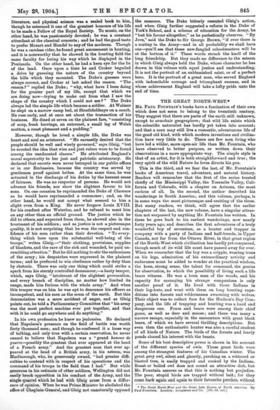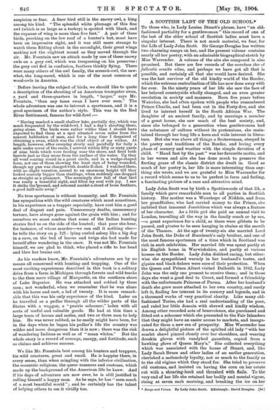Mn. PAUL FOUNTAIN'S books have a fascination of their own
which does not seem to belong to the twentieth century. They suggest that there are parts of the earth still unknown, except to armchair geographers ; that wild life exists which the scientific naturalist has hardly yet taken into account; and that a man may still live a romantic, adventurous life of the good old kind, with which modern inventions and civilisa- tion have very little to do. There are few men living who have led a wilder, more open-air life than Mr. Fountain, who have observed to better purpose, or written down their observations in a more appropriate way. The simple style is that of an artist, for it is both straightforward and true ; the very spirit of the wild Nature he loves directs his pen.
This is the third, and we fear the last, of Mr. Fountain's books of American travel, adventure, and natural history. Readers will remember that the first of the series treated chiefly of the Mississippi Valley, the Yosemite Valley, Cali- fornia and Colorado, with a chapter on Arizona, the most curious of all. In the second, the author described his wanderings in South America; and this volume, perhaps, is in some ways the most picturesque and exciting of the three. But many readers, we think, will agree that the earlier chapters of the last, the new volume, have a singular attrac- tion not surpassed by anything Mr. Fountain has written. In these he goes back to his earliest wanderings, now nearly forty years ago, and describes the first adventures of a truly wonderful boy of seventeen, as a hunter and trapper in company with a party of Indians and half-breeds, in Upper Canada, not far from the Ottawa River, in that great region of the North-West which civilisation has hardly yet conquered, though much of its wild life must have passed away for ever. When we remember that the boy was a cripple, wearing irons on his legs, admiration of his extraordinary activity and endurance must be added to wonder at the practical wisdom, the keen, strong sense, the talent for command, the genius for observation, to which the possibility of living such a life bears witness. He was a born man of the woods, and his capacity for managing his strange companions is only another proof of it. He lived with these Indians in their log-huts, and went with them on long hunting expe- ditions into forests and wildernesses swarming with wolves. Their object was to collect furs for the Hudson's Bay Com- pany, and the life of trapping and hunting was a hard and dangerous one. Foxes and bears were among their chief game, as well as deer and moose; and there was many a narrow escape, especially in the encounters with great black bears, of which we have several thrilling descriptions. But even then the enthusiastic hunter was also a careful student of all kinds of Nature. The birds of the forests and lonely ponds shared his interest with the beasts.
Some of his beet descriptive power is shown in his account of the different species of owls. These great birds were among the strangest features of his Canadian winter. The great grey owl, silent and ghostly, perching on a withered or blasted tree, is easily trapped and cooked by the Indians. Roast or boiled owl does not sound an attractive dish, but Mr. Fountain assures us that this is nothing but prejudice. The poor, stupid birds are trapped without bait ; for they come back again and again to their favourite perches, without • The Great North-West and the Great Lake Region of North Antcrioa. By
Paul Fountain. London ; Longmana and Co. Llas. net.]
owl (which is as large as a turkey) is spotted with black, and the expanse of wing is more than five feet." A pair of these birds, perching on the low roof of a hunter's hut, must have been an impressive sight, and it was still more strange to watch them flitting about in the moonlight, their great wings making not the slightest sound as they moved through the air. Mr. Fountain saw an attack made by one of these snowy owls on a grey owl, which was trespassing on his preserves ; the grey owl fled in confusion, feathers thickly flying. There were many others of the owl family, the screech-owl, the saw- whet,.the long-eared, which is one of the most common of wood-owls in America.
Before leaving the subject of birds, we should like to quote a description of the shooting of an American trumpeter swan, a yard and three-quarters in length, "larger," says Mr.
Fountain, "than any tame swan I have ever seen." The whole adventure was one to interest a sportsman, and it is a good specimen of the author's style. This was in the Red River Settlement, famous for wild-fowl :—
" Having marked a small shallow lake, partially dry, which was much frequented by the wild-fowl, I had a day's shooting there, going alone. The birds were rather wilder than I should have expected to find them at a spot situated seven miles from the laearest habitation of man, and for a long time I despaired of obtaining a swan, which was the chief object of my wishes. At length, however, after creeping slowly and painfully for fully a mile under cover of the reeds, I arrived within fifty or sixty yards of nine birds which were feeding near the shore, and fired both barrels just as they arose from the surface of the water. Up they all went soaring round in a great circle, and in a wedge-shaped form, not one of them showing the least sign of being wounded, though my gun was charged with double B shot. I watched them, with no slight vexation, ascend to an enormous height till they looked scarcely bigger than starlings, when suddenly one dropped as straight as a plummet. The seemingly slow fall of that bird was really a beautiful sight, and filled my soul with joy. I saw it strike the 'ground, and rebound amidst a cloud of loose feathers, a good half-mile away."
No true sportsman is without humanity, and Mr. Fountain has sympathies with the wild creatures which must sometimes, in his experience as a trapper especially, have cost him a good deal of disgust and pain. Unnecessary deaths, unnecessary torture, have always gone against the grain with him ; and for ourselves we must confess that some of the Indian hunting stories find us on the side of the hunted ; that poor she-bear, for instance, of whose murder—we can call it nothing else— he tells the story on p. 121: lying curled asleep like a big dog in a cave, on the bed of leaves and twigs she had made for herself after wandering in the snow. It was not Mr. Fountain himself, we are glad to think, who placed a rifle to her head and blew her brains out.
As his readers know, Mr. Fountain's adventures are by no means all concerned with hunting and trapping. One of the most exciting experiences described in this book is a solitary drive from a farm in Michigan through forests and wild tracks to the then mere village of Marquette, on the southern shore of Lake Superior. He was attacked and robbed by three men ; not wonderful, when we remember that he was alone with his horse and cart, a lad of twenty. It is more remark- able that this was his only experience of the kind. Later on he travelled as a pedlar through all the wilder parts of the States with a waggon, a "prairie schooner," laden with all
sorts of useful and valuable goods. He had at this time a large team of horses and mules, and two or three men to help him. He was never robbed, as he easily might have been, for in the days when be began his pedlar's life the country was wilder and more dangerous than it is now ; there was the risk of wandering Indians as well as of "mean whites." But the whole story is a record of courage, energy, and fortitude, such as claims and achieves success.
We like Mr. Fountain beat among his hunters and trappers, his wild creatures, great and small. He is happier there, in every sense, than when mingling with the inferior civilisation, the eccentric religions, the queer manners and customs, which made up the background of the American life he knew. And if his days of adventure are now over, he is still justified in calling himself a happy man. As he says, he has "seen much of a most beautiful world" ; and he certainly has the talent of helping others to see it vividly too.







































 Previous page
Previous page